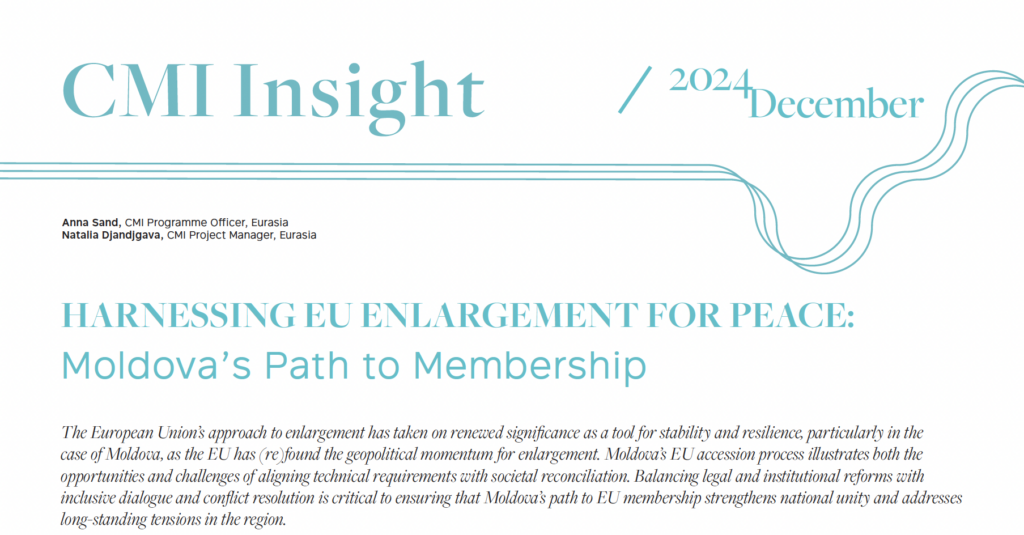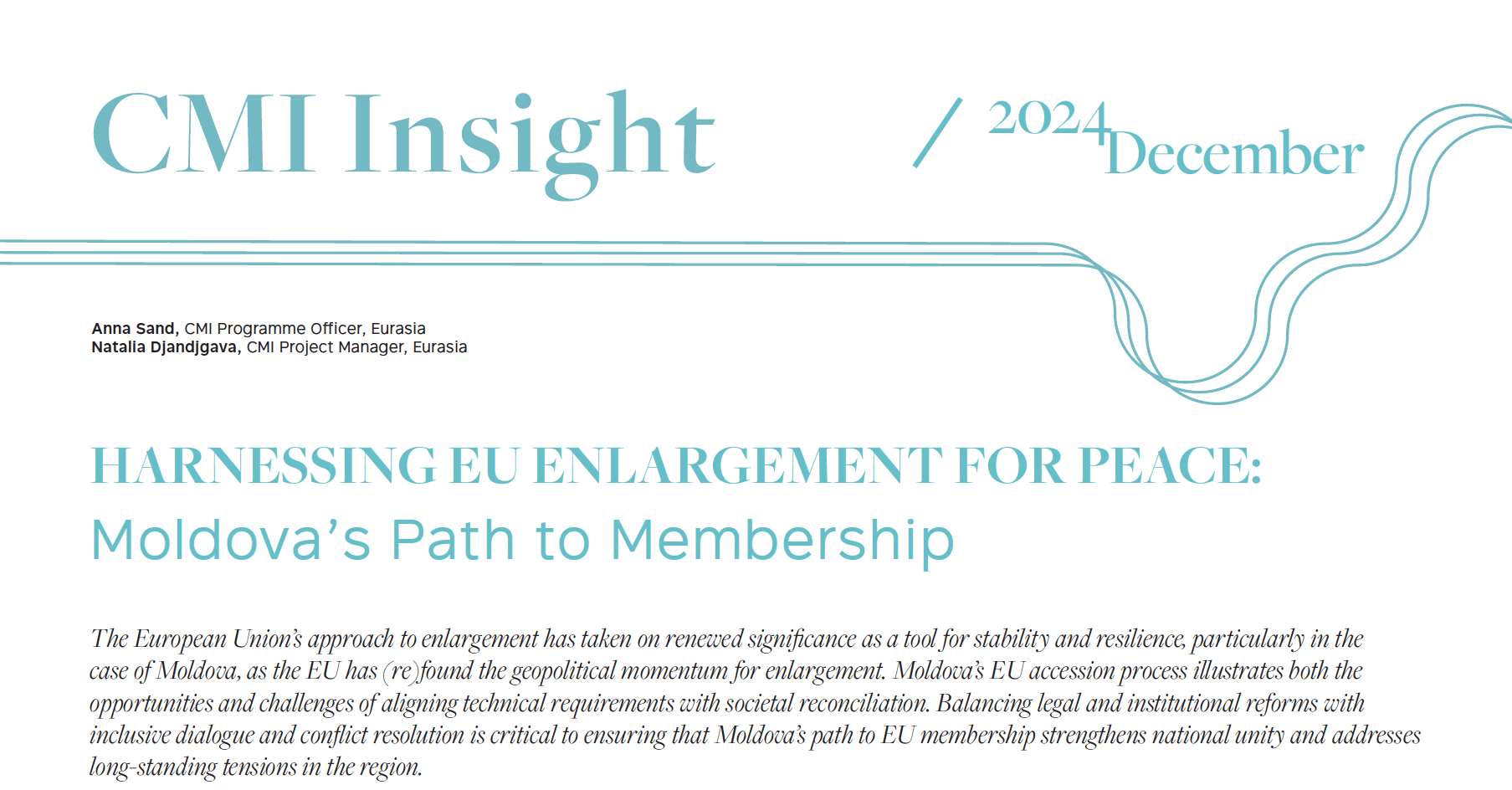The European Union’s approach to enlargement has taken on renewed significance as a tool for stability and resilience, particularly in the case of Moldova, as the EU has (re)found the geopolitical momentum for enlargement. Moldova’s EU accession process illustrates both the opportunities and challenges of aligning technical requirements with societal reconciliation. Balancing legal and institutional reforms with inclusive dialogue and conflict resolution is critical to ensuring that Moldova’s path to EU membership strengthens national unity and addresses long-standing tensions in the region.
Read and download the report here.

The EU’s current approach to enlargement, driven by a ‘’geostrategic, economic, and moral imperative’’, reflects heightened security threats and growing competition in its neighbourhood. In the wake of Russia’s war in Ukraine, EU membership is now more than ever viewed as a strategic choice for the aspiring countries. The accession process itself remains meritocratic, with the EU assessing the accession countries on criteria such as the rule of law and trade, while also steering them towards alignment on broader foreign and security policy.
While technical and foreign policy alignment is essential, societal factors such as inclusive dialogue and conflict resolution are equally vital and should be managed in parallel. Addressing both of these dimensions is key to stabilising the path to EU membership for the candidate countries and to making the enlargement process more robust and sustainable in the long term.
Moldova’s EU ambitions illustrate both the promise and complexity of this path. Moldova has been pursuing closer ties with the EU since 2005, beginning with an EU-Moldova Action Plan under the European Neighbourhood Policy, which laid the groundwork for deeper cooperation and reform. Over the years, the country has signed key agreements, such as the EU Association Agreement and the Deep and Comprehensive Free Trade Area, while aligning its regulatory framework with EU standards. In December 2023, the European Council’s decision to open accession negotiations marked a historic milestone in Moldova’s EU journey. Most recently, in October 2024, Moldova held a referendum on EU membership, voting to enshrine its EU aspirations in the country’s constitution. This was followed by the re-election of pro-European President, Maia Sandu, reaffirming Moldova’s vision for a future within the EU.
KEY TAKEAWAYS
Moldova’s EU membership bid must address legal and institutional alignment, together with peacebuilding and conflict resolution, to ensure a stable accession path.
Broad public understanding of EU benefits and efforts to bridge societal divides, including the final settlement of the Transnistria conflict, is vital.
Substantive and inclusive dialogue between Chisinau and the regions must run in parallel with the technical accession process to enhance resilience and ensure predictability.
At the same time, Moldova continues to experience protracted conflict, most notably in the breakaway region of Transnistria, where deep-rooted historic and ideological complexities intersect with Russia’s geopolitical interests. The Transnistria Settlement Process began in the 1990s, following a brief armed conflict following Moldova’s declaration of independence. Over the years, talks in various formats have sought to address the political, economic, and security challenges. However, no solution has yet been found.
More recently, Moldova has faced increasing challenges with Gagauzia, a region that is home to the Gagauz, a Turkic-speaking minority. In the early 1990s, amid concerns about Moldova’s possible unification with Romania, the Gagauz sought to secure their cultural and political rights. To ease tensions, the Moldovan government granted the region autonomous status through the 1994 Law on the Special Legal Status of Gagauzia, which provided for significant self-governance over cultural, economic and administrative matters while remaining under Moldovan sovereignty. However, tensions resurfaced in 2023 when the banned pro-Russian Shor Party won Gagauzia’s gubernatorial elections. This has had direct implications for Moldova’s national security and heightened friction between the central government and the autonomous region.
The unresolved conflict and the existing tensions between Moldova’s central government and regional authorities, along with the challenges revealed by the recent presidential elections and the EU referendum in terms of achieving a unified national consensus on the country’s EU path, underscore the importance of focusing not only on the country’s alignment with EU legislation and foreign and security policy, but also on addressing societal divisions. Although there is considerable support in Moldova for closer ties with the EU, these challenges, if left unaddressed, could lead to a shift in priorities that undermine the country’s steady progress towards the EU, potentially slowing down the accession process and complicating the implementation of key reforms.
The pursuit of EU membership can provide Moldova with a promising framework for advancing societal cohesion and addressing the underlying causes of conflict. Achieving this will require a multifaceted approach encompassing political, economic and social dimensions, as well as sustained commitment from all relevant actors, including the EU.
For the government of Moldova, the EU candidacy provides an incentive to implement substantial reforms in areas related to pragmatic and prudent conflict resolution, such as inclusive governance, rule of law, human rights, and minority rights. Given the domestic political divisions and opposition to the EU, the union could play a more active role in facilitating dialogue between Moldova’s political elites, including between the central government on the one hand and Gagauzia and Transnistria on the other. Moldova’s central government should also be more strongly encouraged to engage Gagauzia and Transnistria, to establish structured and active communication with these regions to gain broader consensus for planned reforms and policies, and to engage in dialogue on the economic development opportunities offered to Moldova by the EU as part of the accession process. This will help to ensure that Moldova’s path to the EU reflects the needs of all its diverse groups throughout the country, thus contributing to the predictability of Moldova’s accession process as a whole. By keeping all key stakeholders informed, involved, and consulted, misunderstandings can be avoided, and tensions reduced. Ultimately, such an approach will help to build trust between regions, prevent unexpected disruptions and reinforce joint efforts.
RECOMMENDATIONS
Moldova’s EU accession must balance the technical requirements with societal cohesion to ensure a sustainable and predictable process.
The EU should support inclusive dialogue among Moldova’s political elites, especially with Transnistria and Gagauzia, to foster unity and trust.
Clear communication of EU benefits can shift societal perspectives and build widespread support for accession.
Engaging Moldova’s youth is essential to secure their active participation and investment in the country’s European future.
At the same time, efforts should be increased to raise awareness of the tangible benefits of EU membership, particularly in regions and among communities that are more sceptical or resistant. More attention should also be paid to involving Moldova’s youth in the country’s political life, as their low turnout in the presidential elections and EU referendum highlights a missed opportunity. In the context of EU enlargement, engaging Moldova’s youth is essential to prevent external actors from filling this void. The EU should prioritise youth engagement and communication to ensure that young people actively contribute to their country’s European accession process and take ownership of their future.
In conclusion, EU enlargement can be more than a merit-based process – it can serve as a powerful tool to strengthen resilience and stability within the candidate countries. For Moldova, EU candidacy can provide an incentive to build a stronger, more united society by serving as a catalyst to foster inclusive dialogue and peaceful coexistence among Moldova’s diverse communities. Beyond these direct benefits for Moldova, this approach amplifies the EU’s positive influence in its neighbourhood, thus enhancing the strength and appeal of enlargement.
In designing its enlargement strategy, the EU must strike a balance between learning from past experience and acknowledging the unique context of each candidate country. Applying best practices while avoiding repeating past mistakes is critical to refining the process. However, it is equally important to refrain from direct comparisons between new and previous candidate countries, and to ensure that tailored approaches address the specific challenges and opportunities that each country faces on its path to EU membership.
Anna Sand, CMI Programme Officer, Eurasia
Natalia Djandjgava, CMI Project Manager, Eurasia
